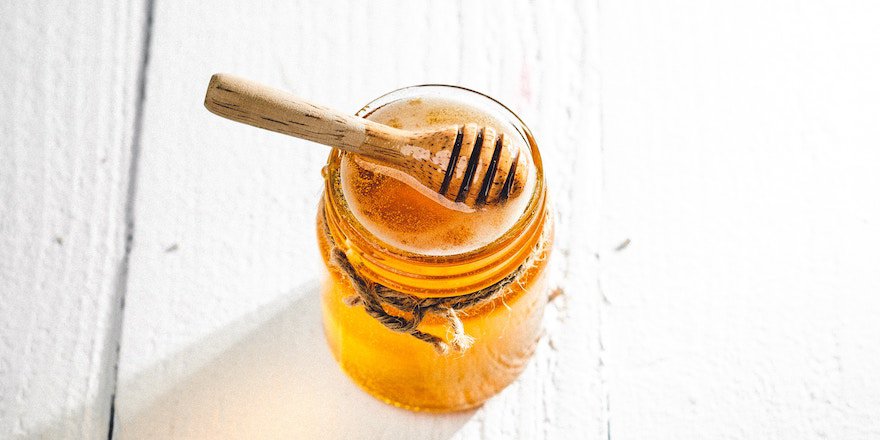Honey has many medicinal uses. A term even arose from its therapeutic uses: the apitherapy.
To understand its potential to fight heartburn, it is essential to understand your symptoms. These stomach acid sensations, also called “pyrosis”, are the result of gastric fluid rising into the esophagus.
To varying degrees, these gastroesophageal refluxes cause burning in the chest or throat, often at night or after meals, breathing difficulties, or an unpleasant taste.
Honey offers a natural alternative to anti-reflux medications, antacids, or PPIs, which are very controversial today. To soothe acid reflux, I share with you several tips about honey and the good habits to adopt.
📚 Read also | A pharmacist helps us choose the best digestive enzymes
Honey, a natural antacid of interest to science
Honey limits inflammation
The generous composition of honey, which I detail below, gives it many benefits: antimicrobial, immune-stimulating, wound-healing, antiseptic, anti-inflammatory, antioxidant, anti-diabetic, detoxifying, and soothing.
It is also a natural ally for digestion by protecting the mucous membranes of the stomach and esophagus. Against heartburn, honey acts by limiting cellular inflammation caused by free radicals.
A synergy of bioactive agents
Numerous scientific studies have delved into the protective mechanisms of honey. Several of them have highlighted its effects on gastrointestinal health thanks to the synergy of its bioactive agents.
A first study shows that dandelion honey could reduce the harmful effects of gastric acidity by about 50%. If honey helps reduce acid reflux, it’s thanks to “a barrier effect”.
An action against gastroesophageal reflux
Another study published in 2001 highlights the positive action of honey in relieving GERD (gastroesophageal reflux).
Honey can also be effective against ulcers and gastritis. Its powerful antimicrobial properties enable it to inhibit Helicobacter pylori, the bacterium responsible for these conditions.
Natural honey has a low pH, which gives it high acidity. It is often mistakenly believed to be harmful for relieving these ailments. Yet it is this pH and its complex composition that make it so gentle and able to fight gastric disorders.
The nutritional properties of honey
Even though the nutritional contents of honey vary depending on the flowers foraged, it contains on average 74 to 80% carbohydrates. These sugars give it that delicious sweetness on the palate.
Other nutrients make up this hive product:
- 20% water
- mineral salts and trace elements
- proteins
- B vitamins
- vitamin C
High antioxidant power
Honey also has an invaluable concentration of antioxidants, mainly in the form of flavonoids: chrysin, polyphenols, quercetin …
Other biochemical compounds make it up, such as digestive enzymes (glucose oxidase, diastase, peptidase…), as well as organic acids and antibiotic molecules.

My tips for using honey for heartburn
You can choose different varieties of honey to reduce heartburn: dandelion honey, acacia honey, buckwheat honey or sunflower honey.
As soon as you feel bothered by acid reflux, make yourself an infusion of ginger and turmeric. Then add a tablespoon of the honey of your choice.
You can consume 3 to 4 tablespoons of honey per day for two days to naturally prevent stomach acid reflux. In a lukewarm drink rather than too hot or in a tasty recipe: in your yogurt, when cooking your vegetables, or on almonds, for example.
Other hygienic and dietary rules for heartburn are essential:
- avoid lying down immediately after a meal; at night, sleep with an extra pillow to elevate your head
- limit tobacco, alcohol, coffee, and very spicy foods
- prefer to eat small portions several times a day rather than large meals
For children under one year old, I strongly discourage introducing honey, to avoid any allergic reaction to bee products and any risk of infection from certain bacteria.
If symptoms persist, consult your doctor to determine the causes of these episodes of heartburn.
📚 Read also | What you need to know before buying royal jelly
Sources and scientific studies
Molan P, 1999. Why honey is effective as a medicine. Its use in modern medicine.
Baltuskevicius A, Laiskonis A, Vysniauskiene D, Ceksteryte V, Racys J, 2001. Use of different kinds of honey for hepatitis A treatment and for reduction of increased acidity of gastric juice.
Al Swayeh OA, Ali ATMM, 1998. Effect of ablation of capsaicin sensitive neurons on gastric protection by honey and sucralfate. Hepato-Gastroenterol.
John de Caestecker, 2001. Esophagus: Heartburn.
Palma-Morales et al. 2023. A Comprehensive Review of the Effect of Honey on Human Health. Nutrients.
Zamri et al. 2023. Honey on brain health: A promising brain booster.



